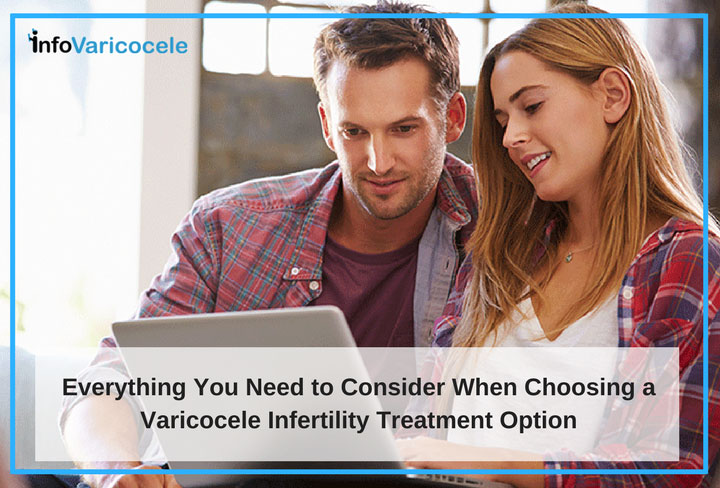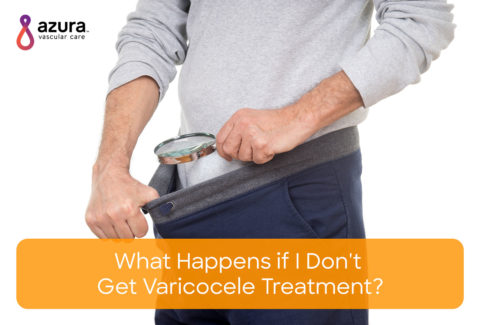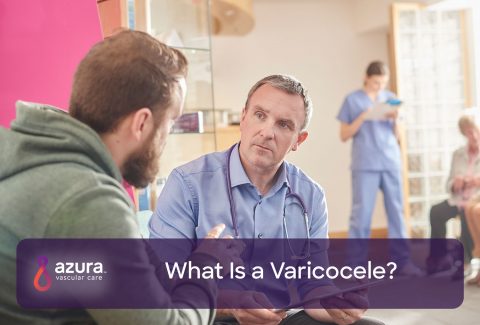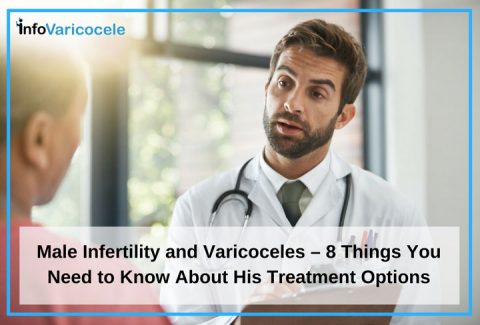
For most couples, the fear and uncertainty of infertility is almost more than they can bear. Infertility is an issue for 1 in 6 couples trying to conceive, and about 30% of those cases are the result of male infertility.[i] Varicocele is the primary cause of infertility in 35% to 50% of couples unable to conceive the first time. And it is the main factor in 81 percent of cases where a couple is attempting to have a second child.[ii]
Before you can move forward in deciding on a course of treatment, it’s important to fully understand the link between varicocele and infertility.
How Are Varicoceles Linked to Infertility?
There are 4 ways varicocele can affect fertility.
1. Low Sperm Count – Varicoceles can cause a low sperm count. Low sperm count is one of the most common causes of infertility and affects almost half of those dealing with male factor infertility.[iii] As blood flow decreases, temperature in the scrotum rises. It’s estimated that sperm count is cut by 40 percent for every degree increase in body temperature.[iv]
2. Low Testosterone Levels – There are studies linking varicoceles to lower testosterone levels. Lower testosterone affects men in a number of ways, including sexual complications.[v]
3. DNA Damage in Sperm – Numerous studies indicate that men with varicocele have more DNA damage to their sperm.[vi]
4. Lower Semen Quality – Studies show that semen in men with a varicocele have more free radicals and decreased antioxidants. This lowers semen quality, making it harder for sperm to thrive.[vii]
Are Varicocele Treatments Successful for Infertility?
There are varying degrees of success for any of the varicocele treatment options. Generally, correcting a varicocele offers benefits including:
- Testicles return to normal size.
- Increased sperm count.
- Better sperm quality.
- Improved DNA in sperm.
- Higher semen quality.
3 Things to Consider When Researching Varicocele Treatment Options
The good news is that there are options. Treatment options for varicocele include varicocele surgery and a minimally invasive procedure called varicocele embolization. Surgical options include open, microsurgical, and laparoscopic procedures. Just as in any decision, there are several reasons why you would choose one course of treatment over another and we have put together a list of the top 3 for you to consider.
1. Pregnancy Success
Understanding the differences in pregnancy success rates when comparing varicocele embolization vs. surgery is key in deciding how to treat varicocele infertility. Here are some important statistics and information to take into consideration:
- The average percentage of natural pregnancies occurring after any varicocele corrective measure is 30 percent, although some studies push the number much higher, to 50 percent.[viii]
- Doctors emphasize that pregnancy is usually not immediate after completing any of the available varicocele repair procedures.
- It typically takes 3 – 4 months for semen health to improve after treatment.
- It can take anywhere from 6 – 12 months to achieve pregnancy after treatment.[ix]
- 6 out of 10 men who undergo treatment will see improvements in semen, and these improvements can contribute to an overall increased chance at pregnancy.[x]
RELATED: Do Varicoceles Cause Infertility and Can it be Reversed?
Success rates of achieving a first-time natural pregnancy after having one of the following varicocele treatment options widely range:
- Open Surgery – 32.9%
- Microsurgical – 43%
- Laparoscopic – 26%
- Varicocele Embolization – 30% – 50%
Studies also indicate that pregnancy becomes more likely in the second year after treatment. The same can be said about subsequent efforts to conceive for second pregnancies.
2. Recovery Time
Recovery time is much faster for varicocele embolization than with any of the surgical options.
- The more invasive surgical options require a 1 – 2 week recovery period for normal strenuous activities, as well as a 4-week recovery period for resumption of sexual intercourse.
- Full recovery after a varicocele embolization is usually 1-2 days, with sexual activity resuming after only 1 – 2 weeks.
3. Cost
In most cases, varicocele embolization is considered cost effective.[xi] It is recommended that you discuss cost with your physician during your consultation. Keep in mind, most insurance companies cover the procedure, but it is always a good idea to check with them first.
What Should You Do Next?
The old adage knowledge is power is true. After being diagnosed with a varicocele, you should continue with research of the various existing varicocele treatment options. The more informed you are, the better you’ll be able to determine the next steps in deciding what treatment is right for you. It is also recommended that you speak to your doctor or schedule a consultation with a local interventional radiologist if you feel that varicocele embolization may be an option for you.
Sources:
[i] http://americanpregnancy.org/infertility/male-infertility/
[ii] http://www.ncbi.nlm.nih.gov/pmc/articles/PMC2664231/
[iii] http://www.mayoclinic.org/diseasesconditions/varicocele/basics/complications/con-20024164
[iv] http://www.parentingweekly.com/preconception/preconception_information/heat_and_male_infertility.htm
[v] http://www.nyp.org/news/hospital/goldstein-varicoceles-testosterone.html
[vi] http://www.ncbi.nlm.nih.gov/pubmed/22809864
[vii] http://www.ncbi.nlm.nih.gov/pmc/articles/PMC3249911/
[viii] http://varicoceles.com/f-a-q-s/
[ix] http://infertility.about.com/od/causesofinfertility/a/Varicocele-And-Infertility.htm
[x] http://www.urologyhealth.org/urologic-conditions/varicoceles/after-treatment
[xi] http://www.sirweb.org/patients/varicoceles/


